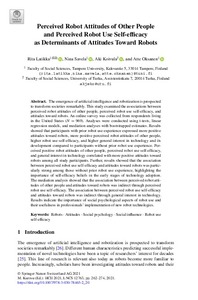Perceived robot attitudes of other people and perceived robot use self-efficacy as determinants of attitudes toward robots
Latikka Rita; Savela Nina; Koivula Aki; Oksanen Atte
https://urn.fi/URN:NBN:fi-fe2021110554176
Tiivistelmä
The emergence of artificial intelligence and robotization is prospected to transform societies remarkably. This study examined the associations between perceived robot attitudes of other people, perceived robot use self-efficacy, and attitudes toward robots. An online survey was collected from respondents living in the United States (N = 969). Analyses were conducted using t-tests, linear regression models, and mediation analyses with bootstrapped estimates. Results showed that participants with prior robot use experience expressed more positive attitudes toward robots, more positive perceived robot attitudes of other people, higher robot use self-efficacy, and higher general interest in technology and its development compared to participants without prior robot use experience. Perceived positive robot attitudes of other people, perceived robot use self-efficacy, and general interest in technology correlated with more positive attitudes toward robots among all study participants. Further, results showed that the association between perceived robot use self-efficacy and attitudes toward robots was particularly strong among those without prior robot use experience, highlighting the importance of self-efficacy beliefs in the early stages of technology adoption. The mediation analysis showed that the association between perceived robot attitudes of other people and attitudes toward robots was indirect through perceived robot use self-efficacy. The association between perceived robot use self-efficacy and attitudes toward robots was indirect through general interest in technology. Results indicate the importance of social psychological aspects of robot use and their usefulness in professionals’ implementation of new robot technologies.
Kokoelmat
- Rinnakkaistallenteet [29335]
